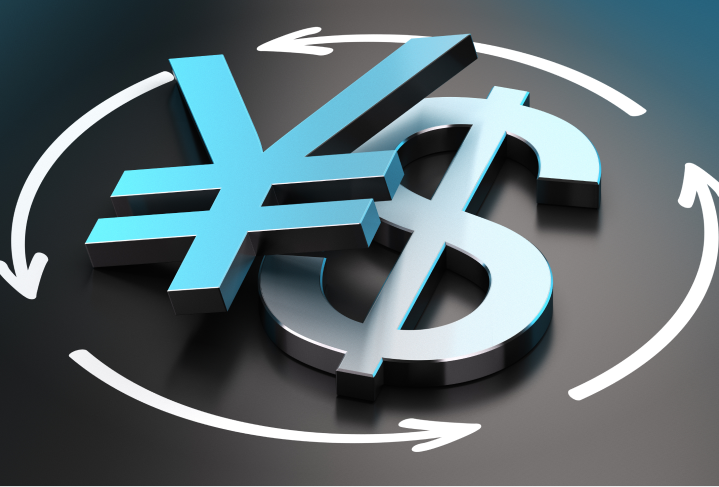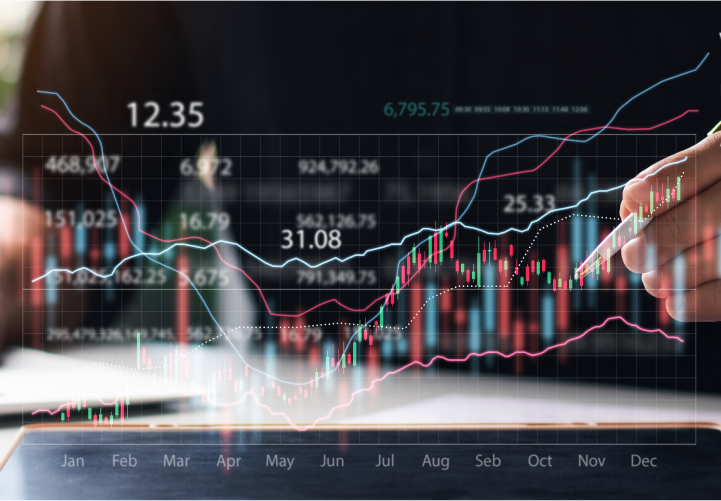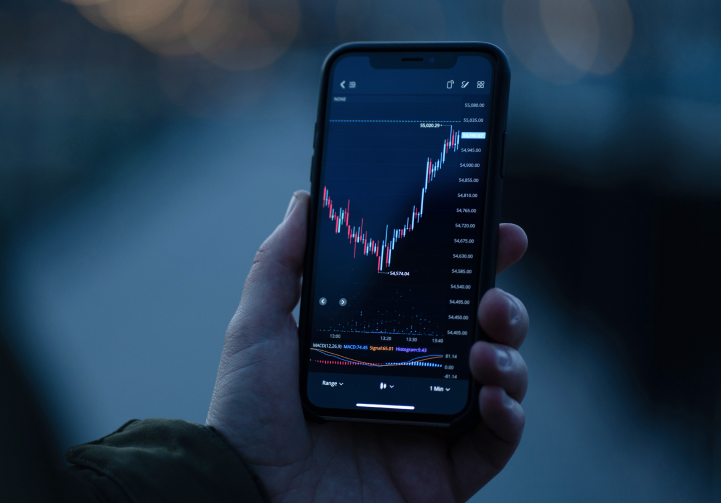
Forex vs crypto
Compare forex vs crypto as we delve into these dynamic and ever-popular trading markets.
Key takeaways
Forex is an established trading market, known for liquidity and earning potential.
Crypto offers new opportunities with high volatility and extended market hours.
Your risk tolerance, trading experience, and goals will determine which is best for you.
Forex vs crypto: A comprehensive comparison for traders
Trading has never been more accessible and diverse than it is today.
As a trader, you're likely familiar with forex, the foreign exchange market, which has been a leading market in the world of financial trading for many years. Recently though, the emergence of cryptocurrencies as a new and exciting asset class has presented traders with a host of fresh opportunities.
In this article, we'll delve into the differences between forex and crypto trading, and help you determine which may be the right fit for your portfolio.
Key components of forex
Key characteristics of crypto
Forex vs crypto: The key differences
| Forex | Crypto | |
|---|---|---|
| Asset types | In forex trading, participants exchange fiat currencies (e.g. USD, EUR, JPY) representing national economies. These currencies are backed by governments and central banks and are used for everyday transactions. | Cryptocurrency trading involves digital coins (assets) like Bitcoin (BTC), Ethereum (ETH), Cardano (ADA) and many others. These cryptocurrencies are decentralised and not tied to any government or central entity. |
| Market participants | Participants in the forex market include central banks, financial institutions, multinational corporations, retail traders, and governments. Central banks influence currency value through interest rate changes and other monetary policy adjustments. | The crypto market has a diverse group of participants, including retail traders, individual investors, institutional investors, miners, and developers. Cryptocurrency has no central control by governments or central banks, and instead, depends on blockchain technology for operation. |
| Trading platforms | Forex trading occurs through platforms provided by brokers, like FXTM. Platforms like FXTM’s Trader app for mobile, MetaTrader 4 and MetaTrader 5 offer a range of tools, charts, and analysis resources. | Trading of crypto coins mostly takes place on dedicated crypto exchanges. Trade brokers, like FXTM, often offer cryptocurrency trading alongside Forex. |
| Ways to trade | Forex trading is primarily conducted through a broker, like FXTM, and characterised by trading currency pairs. Traders can speculate on the price movements of currencies using derivatives, such as Contract for Difference (CFD), without owning the underlying assets. | Traders can buy and sell various coins on dedicated crypto exchanges. This involves taking ownership of the coins and a high level of security to maintain their safe custody. Through a broker like FXTM, traders can engage in CFD trading, where no ownership of the underlying asset takes place. |
| Volatility | Forex is considered less volatile compared to the crypto market. Currency pairs tend to experience gradual price movements, with major fluctuations often driven by economic events or geopolitical factors. | The cryptocurrency market is renowned for its high volatility. Prices can skyrocket or plummet in a matter of hours or even minutes. While this volatility offers significant trading opportunities, it also carries higher risk. |
| Liquidity | The forex market has exceptional liquidity. With a daily trading volume exceeding $6 trillion, it offers traders ample opportunities to enter and exit positions quickly. This liquidity is due to the vast number of participants in the market, with constant trading taking place, ensuring that you can usually execute orders without significant price slippage.While the cryptocurrency market has grown substantially in recent years, it’s still much smaller compared to forex, and its daily trading volume can vary. Liquidity varies significantly among different cryptocurrencies. Major cryptocurrencies like Bitcoin and Ethereum typically have high liquidity, but less popular or newer cryptocurrencies may experience lower liquidity. This may lead to wider spreads and potential difficulties in executing large orders without affecting market prices. | While the cryptocurrency market has grown substantially in recent years, it’s still much smaller compared to forex, and its daily trading volume can vary. Liquidity varies significantly among different cryptocurrencies. Major cryptocurrencies like Bitcoin and Ethereum typically have high liquidity, but less popular or newer cryptocurrencies may experience lower liquidity. This may lead to wider spreads and potential difficulties in executing large orders without affecting market prices. |
| Accessibility | Forex operates 24 hours a day, five days a week, making it one of the most accessible markets for traders worldwide. Trading is divided into four major trading sessions: Sydney, Tokyo, London, and New York, with each session overlapping for several hours. This continuous trading allows traders to react to news and events from around the world in real-time and structure their trading accordingly. | Cryptocurrency markets are open 24/7, including weekends and holidays, making it the most globally accessible market. This non-stop trading is appealing to traders who seek opportunities beyond traditional market hours. It does also mean that crypto prices can be highly influenced by news and events during weekends when other markets are closed, and that crypto traders need to be closely monitoring their trades at all times. |
Forex or crypto: Which is right for you?
The choice to trade forex or crypto depends on your appetite for risk, trading goals, and preferences. There are a few factors to consider.
Risk tolerance
One of the primary considerations when choosing between forex and crypto is your appetite for risk
Market knowledge
The forex market is economically driven, and trading successfully requires a good understanding of the nuances of the macroeconomics, and how changes play out in terms of currency prices across the world.
Forex traders need to understand and monitor:
Economic indicators such as interest rates, Gross Domestic Product (GDP), and employment data.
Political stability and events like elections, leadership changes or government tensions.
Central bank decisions on monetary policy like interest rate changes and quantitative easing.
Trade balances of imports and exports.
Changes to inflation rates for relevant countries and economies.
Market sentiment influenced by news, economic events, and geopolitical developments.
An interest in economics will help forex traders make the most of the market and trade opportunities.
Cryptocurrency is a market more technologically orientated, and less affected – directly – by economics.
Successfully trading the crypto market requires an understanding of blockchain technology and the various fundamental factors that can propel price movements, as well as the indirect influence of the wider global economics.
Crypto traders are encouraged to understand and follow:
Adoption rates and use cases such as payments, smart contracts, and decentralised finance (DeFi).
Technological innovations, advancements, and upgrades.
Regulatory decisions, announcements, and developments in different countries.
Changes in market sentiment to news or social media trends. Positive sentiment can lead to rapid price increases, while negative sentiment can trigger large sell-offs.
Hacks, security breaches, and vulnerabilities in cryptocurrency exchanges or blockchain networks.
Supply and halving events that change supply, scarcity, and price dynamics.
Partnerships with financial institutions and institutional participation.
Broader macroeconomic factors, such as economic crises, currency devaluations, and inflation, that can drive interest in cryptocurrencies as alternative assets and stores of value.
While a deep knowledge of cryptocurrency and blockchain technology isn’t necessarily a prerequisite to crypto trading, a general interest and understanding can be advantageous when looking at trading opportunities.
Security and regulation
Cryptocurrency is a bit of an oxymoron when it comes to security. While the underlying blockchain technology is one of the most secure inventions of our time, the systems built on top of it are still subject to security breaches. Keeping crypto coins safe and out of the hands of cybercriminals requires multilayered security measures. If you’re going to be trading in crypto coins, security is a key consideration for the safe custody of your coins. As CFD traders don’t take ownership of the underlying asset, this is less of a concern, however, regulatory matters should be considered.
Cryptocurrency is still considered an emerging market, without standardised regulatory guidelines for countries across the globe. Openness to adoption and legal oversight can vary vastly between regions. When choosing a broker to trade cryptocurrency, check credentials and verify their regulatory status and reputation for complying with recommended guidelines.
Forex, being a more established and widely recognised market, benefits from broader regulation and entrenched practices and many regulatory authorities overseeing the activities of brokers and traders.
The bottom line
In conclusion, the choice between forex and crypto trading ultimately hinges on your trading objectives, risk tolerance, and preferences.
Forex, characterized by stability and well-established regulatory frameworks, appeals to those seeking a more traditional and regulated trading environment. Conversely, crypto offers the allure of innovation, higher volatility, and lucrative earnings, but this comes with increased risks and security considerations in a relatively less regulated space.
Diversification across both markets can provide a balanced approach, capitalizing on the strengths of each. Regardless of your choice, responsible trading practices, effective risk management, continuous learning, and thorough research are essential for success in both forex and the ever-evolving world of crypto.
FREQUENTLY ASKED QUESTIONS
You may also like...
1 Based on trades for FX Majors with a notional value less than $50,000, on an Advantage, Advantage Plus, or Standard Trading account (MT4 and MT5).
2 Based on Bitcoin (BTC) or Ethereum (ETH) trades with a notional value less than $5,000, on an Advantage, Advantage Plus, or Standard Trading account (MT4 and MT5).









